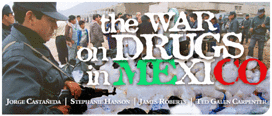On Stephanie Hanson’s reflections, I think two points are in order.
First, today President Calderón signed into law a bill passed by Congress three months ago increasing the amounts of legally possessed drugs, from heroin, to meth, to cocaine. The allowed quantities are very small (smaller than in a similar bill passed in 2006 but vetoed by President Fox because of U.S. pressure), but larger than before. There is a three strikes you’re out provision, but it is a small step in the direction of decriminalization, and it was approved almost unanimously. There is not a consensus in Mexico on decriminalization, much less in public than in private, but there is a growing inclination.
Second, among Mexico’s levers with the United States would be the fact that if a growing number of U.S. states (fifteen at last count) continue to de facto decriminalize, through legalizing medical use and broadening the definition of medical use, we could soon see an absurd situation where the two federal governments spend billions and lose lives trying to stop the flow of drugs into the United States, where in many important states, those drugs are virtually legal. I take James Roberts’ point on this: it is going to be increasingly difficult to make the pitch for full-fledged penalization and a war on supply and demand, if in fact there are more and more loopholes for legal drug consumption. Mexico can use this as a lever to cajole Washington into at least studying the issue, as the Webb Commission has started to do.
On Mr. Roberts other related points, again, I would stress that the Colombia question is in my view more nuanced. I am sure Alvaro Uribe’s intentions are what Roberts suggests, namely taking on the guerrillas first, in order to strengthen the institutions to take on the drug cartelitos later. But I am not so sure that this will actually be the outcome of Uribe’s efforts. It may very well be that his two (or three) terms will have resulted in a significant curtailment of drug-related collateral damages (violence, kidnapping, guerrillas, paramilitaries, corruption), but not a decrease in the actual acreage of coca leaf, the production of powder cocaine, and its export to the United States, Europe, and Brazil, through old routes and new ones. This is not bad, but it could be seen as a de facto and involuntary but hard to deny legalization of drug production.
And finally, clearly a ramped-up Merida initiative would cost much less than health care reform, but I do not think there is any comparison between the benefits the American people seem to see in health care reform (after all, they did elect Obama), and in fighting a proxy drug war in Mexico. On the contrary, my impression is that, while support for the war in public opinion in Mexico, and in power circles in Washington, is still strong, it is ebbing as the costs for all involved grow, and the results are nowhere to be seen.

